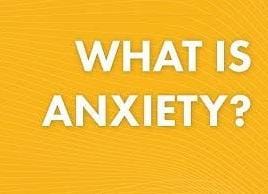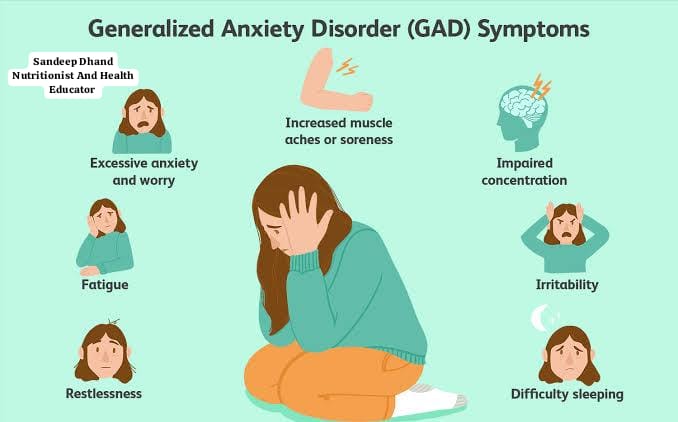Sandeep Dhand
Nutritionist And Health Educator
Anxiety is a natural feeling that everyone experiences at some point in their life. It’s the body’s way of responding to stress, fear, or a feeling of danger. Imagine you’re walking through a dark alley at night, and you hear footsteps behind you. Your heart starts to race, your palms get sweaty, and your mind begins to think of possible dangers. That’s anxiety—a built-in alarm system in your body that prepares you to face or escape a threat. But sometimes, this alarm system goes off when it’s not needed or stays active for too long. That’s when anxiety can become a problem.
Understanding Anxiety

To fully understand anxiety, let’s break it into simple sections:
- What Causes Anxiety?
Anxiety can be triggered by many things, such as:
Stressful events: Losing a job, a loved one, or facing a difficult exam.
Uncertainty about the future: Worrying about finances, health, or relationships.
Trauma or past experiences: A history of abuse, accidents, or other distressing events.
Brain chemistry: Sometimes, anxiety can be linked to an imbalance in brain chemicals like serotonin.
Personality traits: People who are naturally more sensitive or perfectionistic may experience anxiety more often.
Family history: If your parents or close relatives struggle with anxiety, you might be more likely to experience it too.
- How Does Anxiety Feel?
Anxiety can affect your body, mind, and emotions. Here are some common signs:
Physical Symptoms:
A racing heart.
Sweaty palms.
Shaking or trembling.
Feeling breathless or dizzy.
Stomachaches or nausea.
Muscle tension or headaches.
Mental Symptoms:
Constant worrying.
Overthinking situations or decisions.
Feeling like something bad is about to happen.
Difficulty concentrating.
Emotional Symptoms:
Feeling restless or on edge.
Irritability or frustration.
A sense of dread or fear.
It’s important to know that these symptoms are normal in small doses. They become a problem when they occur too often or interfere with daily life.

- Types of Anxiety Disorders
There are several types of anxiety disorders. Each one has unique features, but they all involve excessive fear or worry. Some common ones include:
Generalized Anxiety Disorder (GAD): Constant worry about everyday things like work, health, or family, even when there’s no real reason to worry.
Panic Disorder: Sudden episodes of intense fear called panic attacks. These can happen unexpectedly and include symptoms like a racing heart, sweating, and difficulty breathing.
Social Anxiety Disorder: Fear of being judged, embarrassed, or humiliated in social situations, such as speaking in public or meeting new people.
Phobias: Intense fear of specific things, like heights, spiders, or flying, even if they’re not dangerous.
Obsessive-Compulsive Disorder (OCD): Repeated thoughts (obsessions) and actions (compulsions) that are hard to control. For example, someone might wash their hands repeatedly because they’re afraid of germs.
Post-Traumatic Stress Disorder (PTSD): Anxiety that develops after experiencing a traumatic event, such as an accident or assault.
- Why Does Anxiety Happen?
Anxiety is a survival mechanism that has helped humans survive dangerous situations for thousands of years. When we sense danger, the body releases stress hormones like adrenaline. These hormones make our heart beat faster and prepare us to either fight or run away. This is called the “fight or flight” response.
While this response is helpful in short-term emergencies, modern life often triggers it unnecessarily. For example, worrying about an upcoming meeting might make your body react as though you’re in physical danger. Over time, this can take a toll on your mental and physical health.
- How Does Anxiety Affect Life?
When anxiety is severe or long-lasting, it can impact daily life in many ways:
Relationships: Anxiety can make it hard to connect with others or express your feelings.
Work or School: Constant worry can make it difficult to focus or perform well.
Health: Chronic anxiety can lead to problems like high blood pressure, sleep issues, and a weakened immune system.
Happiness: Anxiety can rob you of joy and make you feel stuck in a cycle of fear and worry.
Dealing with Anxiety
The good news is that anxiety can be managed. Here are some effective ways to cope:
- Self-Care Techniques
Breathing exercises: Deep, slow breaths can calm your mind and body.
Physical activity: Exercise releases feel-good hormones and reduces stress.
Healthy eating: A balanced diet supports brain health and stabilizes mood.
Adequate sleep: Getting 7-9 hours of quality sleep can lower anxiety levels.
Relaxation practices: Activities like yoga, meditation, or journaling can help you feel more grounded.
- Talking to Someone
Sometimes, sharing your feelings with a trusted friend, family member, or therapist can provide relief. Professional therapists are trained to help you understand and manage anxiety.
- Professional Treatments
If anxiety is interfering with your life, professional help is available. Common treatments include:
Cognitive-Behavioral Therapy (CBT): This therapy helps you identify and change negative thought patterns that fuel anxiety.
Medications: In some cases, doctors may prescribe anti-anxiety medications or antidepressants to balance brain chemistry.
Exposure Therapy: Gradually facing your fears in a controlled environment can help reduce anxiety over time.
- Lifestyle Changes
Time management: Organizing your tasks can reduce stress.
Limit caffeine and alcohol: These substances can increase anxiety in some people.
Set boundaries: Saying no to unnecessary commitments can prevent burnout.
When to Seek Help
It’s normal to feel anxious from time to time. But if your anxiety:
Lasts for weeks or months,
Interferes with work, school, or relationships, or
Causes physical symptoms like chest pain or shortness of breath,
It’s time to seek professional help. A doctor or mental health professional can guide you toward the right treatment.
Living with Anxiety
Living with anxiety can be challenging, but it’s important to remember that you’re not alone. Millions of people experience anxiety, and many have found ways to manage it and lead fulfilling lives. By understanding your triggers, practicing self-care, and seeking support when needed, you can take control of your anxiety.
Conclusion
Anxiety is a natural part of life, but it can become overwhelming if left unchecked. Understanding what anxiety is, why it happens, and how to manage it can make a big difference. Whether it’s through lifestyle changes, professional help, or support from loved ones, there are many ways to cope with anxiety and lead a happier, healthier life. Remember, seeking help is a sign of strength, not weakness. You deserve to feel better and live without fear holding you back.